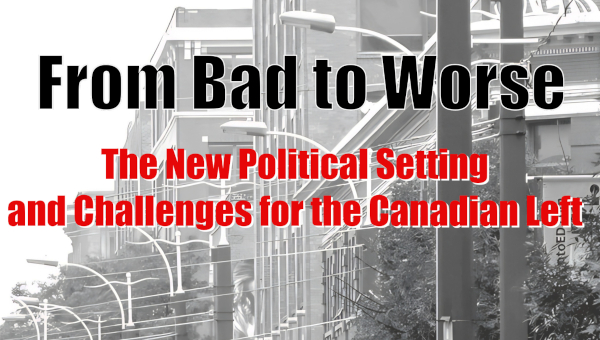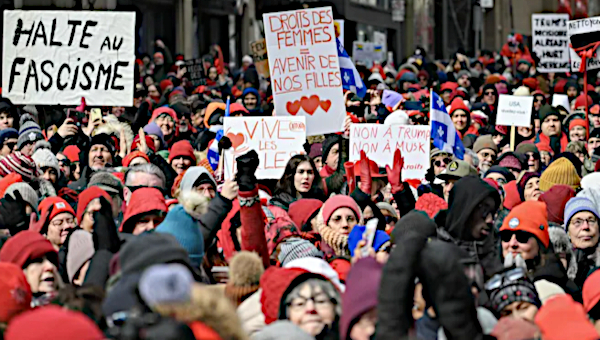The Fiasco of Vancouver’s Municipal Reform Party
A decades-long, municipal reform political party in Vancouver has been dealt a serious blow, possibly put out of action, by a combination of clever manoeuvring by liberal (and Liberal!) political interests and what Reed Eurchuk, writing in the Republic of East Vancouver, has termed, “Suicide by Neglect.”
The party is the Coalition of Progressive Electors (COPE). A right-wing breakaway from the party in 2005 has now succeeded in placing its mayoral
candidate, businessman and neophyte New Democratic Party (NDP) member of the provincial legislature, Gregor Robertson, as a front-runner for the November 2008 civic election. COPE has been left spinning in the dust.
Winter Olympics the key issue
COPE was founded in the late 1960s by the local section of the Communist Party of Canada and other municipal reformers. It was a minority voice in municipal politics for the decades that followed. Then in November 2002, it won the majority of councillors on city council.
It rode to its majority on a wave of opposition to the long-time governing party of Vancouver’s elite, the Non-Partisan (sic) Association (NPA), and to the newly-elected provincial Liberal government of former NPA mayor Gordon Campbell. The election also expressed the population’s great apprehension and opposition to the decision of Vancouver’s business elite to apply to host the 2010 Winter Olympics.
In the lead-up to the 2002 vote, Vancouver’s elite saw a certain writing on the wall. Its party was likely headed for defeat. What to do? As an article by Republic of East Vancouver editor
Kevin Potvin explains, “The nomination of Robertson and his likely win this fall finally completes a nasty job begun in the summer of 2002. That’s when a contract was put out on the life of radical left politics in Vancouver.”
Potvin overstates how “radical” and “left” COPE really was (more on this later). But certainly the city’s liberal, (and Liberal!), elite did succeed in crushing COPE. They did so by successfully placing a Trojan horse into the midst of COPE’s momentum leading to the 2002 vote, in the form of the mayoral candidacy of Larry Campbell (no relation to Gordon).
COPE bowed to the pressure to accept Campbell as its candidate. He was a former RCMP and coroner. His principle mission, on behalf of the elite, was to get the controversy surrounding the Winter Olympics out of the way and get the project up and going. Billions of dollars in construction, real estate and tourism profits were to be made and COPE’s hesitancy to support the bid was risking that the deadline be passed. The party membership was demanding a referendum on the matter. The stakes were very high.
Campbell pushed for a non-binding plebiscite on the Olympics (“non-binding” in case the “yes” side should lose, no doubt), confident that the combination of big money and COPE timidity could win the vote. Only the city of Vancouver held a plebiscite; the suburban governments in the region were not under the same pressure as was Vancouver’s, though they and their residents will nevertheless foot the bill.
The elected COPE councillors were divided on the issue. Three of them – Fred Bass, Tim Louis and Anne Roberts – spoke against the Olympics. They also opposed a new Olympics-related, multi-billion dollar rapid transit line to link the Vancouver airport to downtown. In this, they were bucking the provincial NDP and the BC Federation of Labour who were supporting the Olympics.
The future Vision leaders (the splitting municipal faction discussed below) tried to kick the recalcitrant COPE councillors off the party executive. But this effort failed because the membership was largely anti-Olympics. Meanwhile, COPE had never used methods of popular mobilization in its political strategy, so the plebiscite was won rather handily by the two Campbell’s (mayor Larry and premier Gordon) et al. The vote passed in February, 2003 by 64 per cent, with a fifty per cent voter turnout.
With the Olympics juggernaut firmly in place, the remainder of the COPE city government’s three-year term was uneventful. Precious little was done to address the chronic problems in the city of poverty, homelessness, police violence and injection drug addiction. Ditto for the city’s growing transportation and pollution problems, and its rising cost of housing. Preparations by the city’s elite to reap the benefits of the Olympics bonanza charged ahead full steam.
Larry Campbell, his job done, was appointed by Prime Minister Paul Martin to the Senate during the run-up to the November 2005 election.
The Right Wing Split
In the lead-up to that election, Campbell and the rest of the right wing in COPE were not satisfied that the party could be relied upon to carry out their pro-business interests. It still showed some inclination to listen to its largely-working class membership and supporters, as evidenced by the decision of some of its elected councillors to voice opposition to the Olympics. So the right wing split, forming “Vision Vancouver” and sticking COPE with a substantial debt left over from 2002.
The 2005 election was a debacle for COPE. It lost all of its city council seats excepting one, David Cadman. Vision elected four; the NPA won the majority of council with six seats. Vision’s mayoral candidate, Jim Green, narrowly lost. COPE had ceded the mayoral terrain to Green.
2008 Election
COPE has dithered throughout the run-up to the November, 2008 election, waiting for the outcome of the mayoral choice of Vision. The most-right wing of the three Vision candidates finished a distant last. Gregor Robertson won a first-round victory and presents an attractive candidacy for business interests that would like to put a fresh face, though not necessarily some fresh ideas, into the mayor’s chair. With few ideas distinct from Vision (COPE does not have a published program, it does not even maintain a website at this time), the party has once again ceded the mayoral race.
Even COPE’s place on city council is in jeopardy. It proposed to Vision earlier this year that the two parties share candidacies for the eleven city council seats. Four COPE leaders have indicated they would run, including David Cadman. So far, Vision has said, “not interested.”
The most likely outcome is that Vision will graciously accept a few of the former COPE councillors onto its slate. COPE will fade into history. And left wing forces in Vancouver that have followed COPE into the political abyss for years are left, once again, with no candidate for mayor of the city, and quite possibly no candidates for city council at least pretending to represent the voice of working people. What a debacle!
Lessons
So what lessons can be drawn from all this? COPE is a failed experiment for the left and labour movement in Vancouver. Or perhaps we could say the failure of the left and labour to fight for a meaningful program within the party has sealed its fate as a failed experiment. I believe there are three features of COPE that explain its decline:
- There is little in the party’s program that distinguishes it from the likes of Vision, or even the NPA. The provincial NDP has a more progressive and meaningful program than COPE, and that’s not saying much!
- For several decades now, the party has been little more than an electoral machine. It has never developed strategies of mass mobilization and popular involvement. Its internal life has degenerated to be little more than annual meetings to elect (select?) executive members and (come election time) candidates for office.
- COPE has always refused to create meaningful ties with the labour movement. The party’s Communist Party and reform-minded founders fought bitterly against COPE becoming a party like the NDP with formal trade union and other social movement affiliation. Their’s is a vision of a multi-class party that seeks allies among the “progressive wings” of their respective ruling classes or among the “democratic imperialists.”
The decisive factor in the party’s decline is its refusal to engage in popular mobilization and involvement. Imagine, for one moment, if the leaders of Venezuela’s Bolivarian Revolution tried to direct the momentous changes in their society by edicts from the presidential palace. Their project would have gone down to defeat long ago. Our standards and expectations of social change should be no different in an advanced capitalist country. Without popular mobilization, there can be no lasting or meaningful reforms in society, leave alone wholesale change.
The left and labour movement in Vancouver must discuss and draw lessons from the COPE experience if we are ever to mount a meaningful political challenge to the corporate barons that control the city. I fear this is not likely in the short run. It seems the city will have to suffer further social and environmental degradation before people who should know better get organized to change its political course. •




